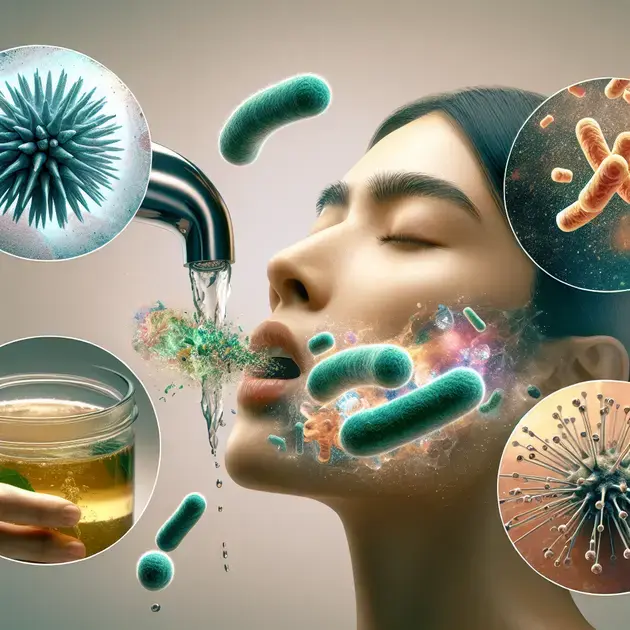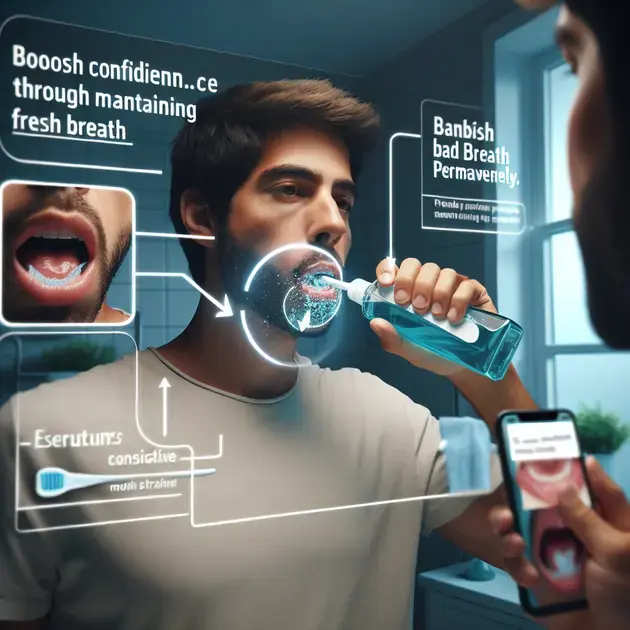Dealing with bad breath, also known as halitosis, can be a persistent and embarrassing issue for many individuals. Whether it’s caused by poor oral hygiene, certain foods, or underlying health conditions, the impact of bad breath can be significant on one’s confidence and social interactions.
Fortunately, there are several effective strategies to prevent and combat bad breath effectively. From maintaining a consistent oral care routine to staying hydrated and avoiding certain foods, taking proactive steps can help you keep bad breath at bay and enjoy fresh breath throughout the day.

Effective Oral Hygiene Practices
Proper oral hygiene practices are essential for maintaining healthy teeth and gums. Here are some effective practices to incorporate into your daily routine:
Brushing:
Brush your teeth at least twice a day with a fluoride toothpaste. Use a soft-bristled toothbrush and gentle, circular motions to clean all surfaces of your teeth.
Flossing:
Don’t forget to floss daily to remove plaque and food particles from between your teeth. Use a gentle back-and-forth motion to clean along the sides of each tooth.
Mouthwash:
Rinse with an antimicrobial mouthwash to kill bacteria and freshen your breath. Swish the mouthwash around for about 30 seconds before spitting it out.
Regular Dental Visits:
Visit your dentist for check-ups and professional cleanings every six months. This will help prevent any potential oral health issues from developing.
Dietary Choices:
Eat a balanced diet rich in fruits, vegetables, and whole grains. Limit sugary snacks and beverages that can contribute to tooth decay.
Hydration and Diet Impact on Bad Breath
Proper hydration and a healthy diet play crucial roles in preventing bad breath. Here’s how these factors can impact the freshness of your breath:
Hydration:
Drinking an adequate amount of water helps keep your mouth moist and washes away food particles and bacteria that can cause bad breath. Aim to drink at least eight glasses of water per day.
Dietary Impact:
Certain foods like garlic, onion, and spicy dishes can leave lingering odors in your mouth. Opt for fresh fruits and vegetables, which can help neutralize odors and promote saliva production.
Snacking Habits:
Avoid constant snacking, especially on sugary or starchy foods. These types of snacks can lead to an increase in oral bacteria, which may result in bad breath.
Chewing Gum:
Sugar-free gum can help stimulate saliva production and mask temporary bad breath. Look for gum with xylitol, a natural sweetener that can also help fight bacteria in the mouth.
Limiting Alcohol and Tobacco:
Alcohol and tobacco products can contribute to dry mouth and foul breath. Limit your consumption of these substances to improve your overall oral health.
Proactive Steps to Combat Halitosis
Halitosis, or chronic bad breath, can be a persistent issue for some individuals. Taking proactive steps to combat halitosis can improve your oral hygiene and overall confidence. Here are some strategies to address halitosis:
Proper Brushing Technique:
Ensure you are brushing your teeth properly, including your tongue, to remove bacteria and food particles that can cause bad breath. Use a tongue scraper for a more thorough clean.
Mouthwash with Chlorhexidine:
Consider using a mouthwash containing chlorhexidine, an antimicrobial agent that can help kill bacteria in the mouth and neutralize odors. Use as directed by your dentist.
Treat Underlying Conditions:
Visit your dentist to address any underlying dental issues, such as gum disease or tooth decay, that may be contributing to halitosis. Proper treatment of these conditions can improve your breath.
Stay Hydrated:
Drink plenty of water throughout the day to keep your mouth moist and reduce the risk of dry mouth, which can lead to bad breath. Add lemon or mint to your water for a fresh breath boost.
Healthy Lifestyle Choices:
Avoiding tobacco products, eating a balanced diet, and maintaining regular dental check-ups can all contribute to fresher breath and better overall oral health.

Understanding the Link Between Oral Health and Bad Breath
Oral health plays a crucial role in preventing bad breath, also known as halitosis. When we neglect our oral hygiene, bacteria in the mouth can multiply and produce odorous compounds that cause unpleasant breath. Brushing and flossing regularly, along with routine dental check-ups, are essential for maintaining good oral health and reducing the risk of bad breath.
Poor oral health can lead to the buildup of plaque on teeth and gums, creating an ideal environment for bacteria to thrive. These bacteria can release sulfur compounds, such as hydrogen sulfide, which contribute to the foul odor associated with bad breath. In addition, untreated cavities or gum disease can also be underlying causes of halitosis.
Furthermore, certain foods, such as onions and garlic, can also contribute to bad breath by releasing volatile compounds that are carried into the lungs and exhaled. Maintaining a balanced diet and staying hydrated can help reduce the impact of these foods on your breath. Additionally, smoking and alcohol consumption can dry out the mouth and increase the risk of bad breath.
It is important to recognize that bad breath can sometimes be a symptom of an underlying health issue, such as diabetes, respiratory infections, or liver problems. In such cases, addressing the underlying medical condition is crucial for effectively managing halitosis. Consulting with a healthcare professional can help identify the root cause of persistent bad breath.
Overall, understanding the link between oral health and bad breath underscores the importance of maintaining good oral hygiene habits and seeking professional care when needed. By taking proactive steps to care for your teeth and gums, you can mitigate the risk of halitosis and enjoy fresher breath.
Exploring the Role of Bacteria in Halitosis
Bacteria play a significant role in the development of halitosis, or bad breath. The human mouth is home to various types of bacteria, some of which can produce foul-smelling compounds when they break down food particles and other debris. Understanding the specific bacteria involved in halitosis can help in effectively addressing the issue and improving oral hygiene practices.
One common culprit in bad breath is the bacteria that reside on the back of the tongue. These bacteria can produce volatile sulfur compounds, such as methyl mercaptan and hydrogen sulfide, which give rise to the characteristic odor of halitosis. Regularly cleaning the tongue with a tongue scraper or toothbrush can help reduce the population of odor-causing bacteria.
In addition to the tongue, bacteria can also accumulate between the teeth, along the gum line, and in the pockets of gum tissue. Poor oral hygiene practices, such as infrequent brushing and flossing, can lead to the proliferation of these bacteria and the development of bad breath. Thoroughly cleaning all surfaces of the mouth, including hard-to-reach areas, is essential for preventing the buildup of odor-causing bacteria.
Certain oral conditions, such as periodontal disease, can exacerbate the presence of bacteria in the mouth and contribute to halitosis. Gum inflammation and infection provide an ideal environment for bacteria to thrive and produce malodorous compounds. Seeking treatment for gum disease and maintaining good oral hygiene are essential steps in addressing the bacterial aspect of bad breath.
By exploring the role of bacteria in halitosis, individuals can better understand the importance of proper oral care and the impact of bacterial populations on breath odor. Implementing effective strategies to combat the growth of odor-causing bacteria can lead to fresher breath and improved overall oral health.
Natural Remedies for Fresher Breath
While traditional oral hygiene practices like brushing and flossing are essential for combatting bad breath, natural remedies can also play a role in freshening breath and maintaining oral health. Incorporating natural ingredients with antibacterial and breath-freshening properties into your oral care routine can help reduce the occurrence of halitosis without the use of harsh chemicals.
One natural remedy for fresher breath is oil pulling, an ancient practice that involves swishing oil (such as coconut or sesame oil) in the mouth for several minutes. Oil pulling can help remove bacteria from the mouth and reduce the buildup of plaque, ultimately contributing to improved breath odor. Adding a few drops of essential oils, like peppermint or tea tree oil, to the swishing solution can further enhance the antibacterial effects.
Another natural approach to combating bad breath is to increase your intake of water and stay hydrated throughout the day. Water helps cleanse the mouth of food particles and bacteria that can contribute to halitosis. Drinking green tea, which contains polyphenols with antimicrobial properties, can also help freshen breath and inhibit the growth of odor-causing bacteria.
Herbs and spices such as parsley, mint, and cloves have been used for centuries to naturally freshen breath. Chewing on fresh parsley leaves or mint leaves can help neutralize odors in the mouth and leave a fresh scent. Cloves, with their antimicrobial properties, can be used to make a natural mouthwash that combats bacteria and promotes fresher breath.
Incorporating these natural remedies into your daily oral care routine can complement traditional methods of preventing bad breath and promote overall oral health. By embracing natural ingredients and their beneficial properties, you can enjoy long-lasting freshness and a healthier mouth.
Conclusion
Understanding the link between oral health and bad breath is crucial for maintaining fresh breath and overall oral hygiene. Neglecting oral care can lead to the multiplication of bacteria in the mouth, resulting in the production of odorous compounds that cause halitosis. By prioritizing regular brushing, flossing, and dental check-ups, individuals can effectively reduce the risk of bad breath and promote good oral health.
Bacteria play a significant role in the development of halitosis, with specific types of bacteria, such as those residing on the back of the tongue, contributing to foul-smelling compounds. Proper oral hygiene practices, including cleaning hard-to-reach areas and addressing conditions like periodontal disease, are essential for combating the proliferation of odor-causing bacteria and improving breath odor.
Natural remedies, such as oil pulling with coconut or sesame oil, increasing water intake, and incorporating herbs like parsley and mint, offer additional ways to freshen breath and maintain oral health. These remedies, coupled with traditional oral care practices, can help individuals combat bad breath without harsh chemicals and promote long-lasting freshness for a healthier mouth overall.

















